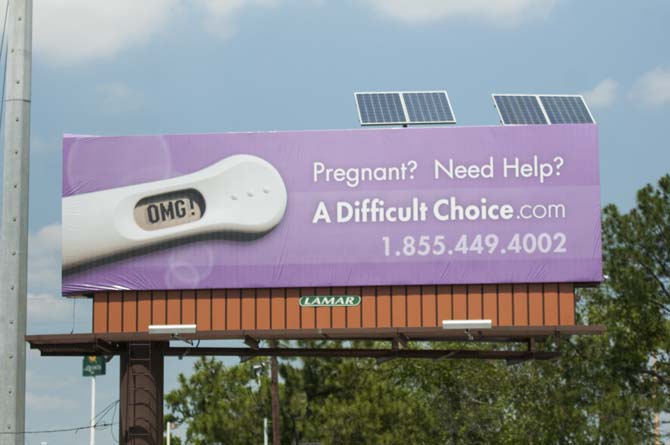As you were headed out for spring break last week, you may have noticed a new billboard on South Acadian Thruway. With just the phrase “Pregnant?” and a phone number, it’s not clear what the organization is or what its affiliations are.
Neglecting to disclose information about the organization’s affiliations can lead to a pregnant individual seeking guidance, but receiving religiously skewed and sometimes incorrect information while trying to make an important and difficult choice.
Purchasing billboards like these is a common practice by anti-abortion groups, often advertising a crisis pregnancy center. A religiously affiliated organization has been advertising in The Daily Reveille this semester with a similar slogan: Pregnant? We Can Help.
Crisis pregnancy centers have been the answer given by anti-abortion groups, often religiously affiliated, when they take down abortion clinics in conservative areas. While they intend to provide the mother with abortion alternatives, some radical supporters have gone further than necessary to ensure a full term pregnancy.
Reproductive rights activist Jaclyn Munson went undercover into a crisis pregnancy center in New York City. Workers in white lab coats were friendly to Munson at first, but eventually began shaming Munson for having sex outside of marriage.
She also reported being given misinformation about abortive services, such as the myth that abortion can lead to risk of conceiving in the future or cancer.
Munson’s experience is not uncommon. In undercover investigations by pro-choice groups across the country, numerous CPCs have been found to pose as medical facilities that want to keep women from getting abortions by any means necessary — even if it means being outright dishonest.
When we go to a medical provider, we expect accurate, honest medical treatments. And that comes without the judgement or religious opinions of their medical practitioner.
The reproductive health care issues we face as a country are tangled with religion and political affiliations, and radical supporters from all sides are making it dangerous for women.
When doctors prescribe medication to patients, it’s important that the patient know how it would interact with other medications they’re taking. For individuals on birth control, not knowing how other drugs would interact could lead to unwanted pregnancy.
But with lawsuits all over the country concerning pharmacists refusing to sell prescribed birth control, it’s not crazy to think they could voluntarily neglect to warn of any drug interactions that would render birth control ineffective.
The beliefs of those in the medical field are not limited to refusing to sell birth control or perform abortions. Several women have reported to hystersister.com that they were denied hysterectomies because they did not have children.
The doctors tell young women that they may not want children right now, but they will change their minds. They say motherhood is something that all women want. And worst, they don’t respect a woman’s decision to remove her reproductive organs.
The reproductive choice debate has been stalled for decades as we try to define life. But now there are women who are refused surgery because of a life that has yet to be conceived.
Individuals who no longer wish to use their reproductive organs should be allowed to make that decisions for themselves, and it should be respected.
The reproductive rights debate continues, even 40 years after Roe v. Wade was decided. And each day reproductive health care becomes more dangerous. It is important that we figure these issues out and establish a code of ethics for those within the medical community.
Otherwise, individuals will continue to question the accuracy and legitimacy of the medical information and treatments they receive.
Jana King is a 19-year-old communication studies sophomore from Ponchatoula, La.
Opinion: Reproductive rights debate detrimental to health care
By Jana King
April 23, 2014
A Difficult Choice ad is displayed Wednesday, April 23, 2014 near Perkins Rd and South Acadian.
More to Discover








